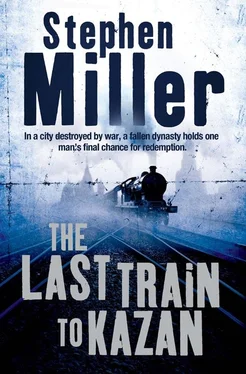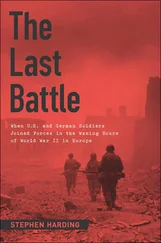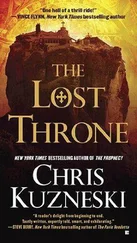So he had nothing.
An area had been carved out of the offices upstairs; it looked like the kind of room a school headmaster might have as an office. There was a furnace in the corner, and in the ‘beautiful’ corner opposite a collection of empty shelves with holes in the plaster where the icons had been stripped away by the Bolsheviks and not yet restored by the new government.
A sergeant supervised the seating of their prize; a few minutes later he heard voices, and an officer came in. The guards left, closing the door behind them. Ryzhkov nodded, and said ‘Good afternoon,’ although it was still morning.
The door opened and a secretary came in. ‘All right, tell us your story,’ the secretary translated. Then the questioning began, and curiously it relaxed him.
‘Tell him,’ he said to the secretary, ‘I’m only trying to get out of here. I was working for the French in Moscow, the Reds caught me, I was released for a few hours and I ran. I had papers but I destroyed them. I’ll tell you everything I know, but it’s not much…’ It went on and on, and he told it flatly with as much dignity as he could muster. The more he talked, the more it sounded like blather. Even the secretary was looking at him with a smirk. At the end there was a silence and he tried to pick it up by telling them about his recruitment by the Deuxième Bureau and his work in Paris, but sitting there looking at them he realized how absurd it all sounded.
The officer sniffed, shook his head, flicked the remains of his cigarette out of the window and looked out on the courtyard below. On the breeze in the warm summer day were the sounds of military commands, the clashing of rifles being stacked on the cobbles, the sounds of gulls being startled from under the eaves, angry at the intruders.
‘Come here,’ the officer said in passable Russian, and Ryzhkov got to his feet and shuffled over to the window. Across the courtyard a wide gallows was being set up. It looked like something standard, from a kit. Struts and braces that a section of men could load on the back of a lorry and screw together as needed.
‘This is civilization now,’ the officer said. His voice was quiet. Purring. The accent unusual. ‘This is what we have come to,’ he said, looking around at Ryzhkov. They were about the same age, he realized, but the officer was immaculate – his moustache flecked with grey, the eyebrows dark and even, the eyes light blue and steady, the complexion a little darker, with golden tones rather than pink. A smile. ‘So, you have been telling us the truth today, signor?’
‘Yes, Excellency.’ Ryzhkov almost reflexively bowed as he said it.
‘Well, you’ve certainly had a very turbulent time. It’s quite a story. Worked for the Okhrana? Ran away to France? Fought like a tiger, and now you’re here. “Released for a few hours,” did you say?’
Ryzhkov nodded and a ‘Yes, Excellency’ escaped his lips like a whisper.
‘You’d better tell me if you’re lying, yes? It’s so much better if you tell me now, much better instead of me finding out later that you’ve been untruthful, eh?’
‘It’s all the truth, I swear it.’
‘Swear?’ the man said, almost laughing. ‘“Swear to God”, eh? It’s all true and you want to live? Live a long and happy life, work, have children, a little home. And maybe do something, something useful here in town…’ The officer gestured and simultaneously there was a metallic clang as the workers outside tested the gallows trap. The gulls took off again, a chorus of shrieks echoing in the courtyard, wheeling overhead. There were the dim sounds of laughter, the men congratulating themselves on a job well done.
‘Well, maybe you’re just hungry, or maybe you’re truly a French agent. I’m checking on that part of your tale right now, but since you want to be helpful and you have no choice I suppose I can put you to work, now that you understand the circumstances.’ The officer turned, looked out at the gallows and then lifted his hand to his neck and made a garish death’s face – tongue lolling out, eyes rolled up. Like a schoolyard clown. Then he laughed and went back to the desk.
‘All right then…’ The officer spread his hands out on the surface of the desk, leaned back in his chair, a smile flirting with the corners of his mouth. ‘I am Conte Captain Tommaso di Giustiniani, and for the moment I am head of counter-intelligence in Yekaterinburg, and your saviour. And now that we’ve both washed up here in this…enthralling little city,’ he said with that slow smile, ‘there is really only one great question to answer: Where’s the Tsar? Yes? It is all very puzzling, and, since you are so devoted to the truth, Ryzhkov, perhaps we can find it together.’
The first train arrived just after four carrying the headquarters of White General Golitsyn, his deputy, Major de Heuzy, and several cars of hangers-on and support staff, a melange of diplomats, spies, adventurers, journalists, disgruntled fugitives and commercial opportunists – a population made up of the lowest forms of life, all of them hungry and in search of food and lodging.
By afternoon the citizenry had reclaimed the streets and the city was suddenly busy, swarming with all varieties of blue-uniformed Czechs, the officers striding possessively through the shopping district, all of them demanding service and willing to pay, although it was in paper roubles that had been over-stamped by the White Kolchak-led government, or in letters of credit that no one could understand. There wasn’t really any choice: if you had something they wanted you could either sell it for the pretend money or they’d just requisition it.
Over dinner the details came out. Ryzhkov was fed lavishly at the Fez, a restaurant across the square that had immediately been taken over as the officer’s club. The room was not crowded, they were eating between hours. A troika of Czechs held serious talk over cigars in the corner. The waiters came in and out, resetting the tables, tidying up for the dinner hour. Giustiniani had taken one bite when he began laughing at the quality of the cooking.
‘You know,’ Giustiniani said haltingly so that he wouldn’t choke, ‘I have been all over the world, based in some lovely cities. Everywhere, in every port there is at least one reasonably decent restaurant.’ His fork stirred the concoction on his plate. It looked like a small steak of some kind smothered in a brown camouflaging sauce, and potatoes that had been mashed and blended with cabbage beside it. Ryzhkov couldn’t decipher it either although it hadn’t stopped him from wolfing it down. ‘Every port brings people in, you know, from elsewhere. New blood, strangers with new ideas – fertilization,’ Giustiniani continued wistfully, took a sip of wine and winced, shook his head and pushed the hateful dish away.
With nothing to fill his mouth, Giustiniani was free to tell his life story while Ryzhkov ate, and so began a poetic and amusing saga of olive groves and grapevines and cypress trees.
Tommaso di Giustiniani was a submariner in the Italian navy who had surfaced just in time to be sent to Russia to help the Allies quell the worldwide revolution. He had ceased to refer to himself as nobility, dropping the ‘Conte’ and shortening his name. ‘The family is…well, it is not what it was,’ he said by way of explanation.
Giustiniani liked to entertain and he liked to talk, and he had, apparently, all the time in the world to do it. But Ryzhkov saw him for a man who preferred being underestimated, preferred to conceal his true strength inside. You didn’t go down in those tin cans if you didn’t have the black space inside you somewhere, and you didn’t last if you didn’t know how to handle men. For Giustiniani, dropping his noble connections was an obvious first step; a title and estates were worthless when pressure was cracking the hull, or when the destroyers were trying to find you, and all the crew knew it. Ryzhkov wasn’t an expert on the Italian underwater boat service, but he knew that all such machines were fantastic creations that used the most expensive materials in their defiance of the seas. Thus, despite his old-world charm, the lazy smile, the unmuscled gestures, Giustiniani was a modern man.
Читать дальше












